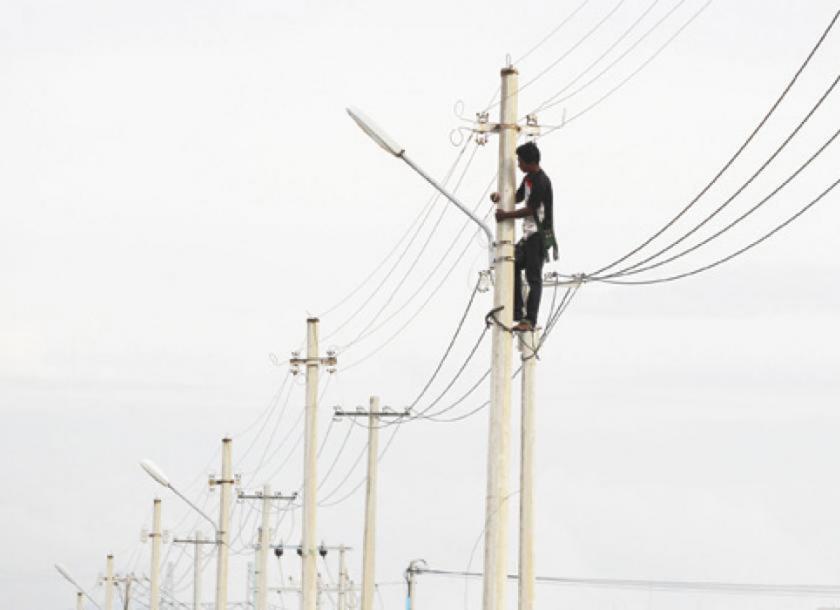Ministry of Electricity and Energy (MOEE) is still negotiating the terms of several power purchase agreements (PPA) on liquefied natural gas (LNG)
19 มีนาคม 2561
The Ministry of Electricity and Energy (MOEE) is still negotiating the terms of several power purchase agreements (PPA) which will determine the amount of power that will be purchased and distributed to the public over the next three years.
The PPAs are being discussed with parties involved in importing and converting liquefied natural gas (LNG) to electricity in Myanmar. If successful, it will be the first time Myanmar is using LNG to produce electricity.
But electricity generated in this manner will not come cheap. “It could add $1-$2.5 per million British Thermal Units (mmbtu) on top of the LNG import price,” Prasanth Kakaraparthi, an analyst at Wood Mackenzie, told The Myanmar Times in February.
That implies that electricity costs could rise in the future. Currently, for residential use, K35 is collected per unit if the electricity used is between one and 100 units; K40 is collected per unit if it is between 101 and 200 units and K50 collected per unit for over 201 units. For businesses, K75 is collected per unit if the electricity used is between one and 500 units and K100 collected per unit for over 3,001 units, The Myanmar Times understands.
However, as the PPAs are still under negotiation, Myanmar has yet to announce if it will be importing the LNG based on long term contracts or on spot prices, which are more volatile.
“We are still negotiating the details and making the deals. If we can purchase the power, we will. If not, then we won’t,” U Win Khaing, Union Minister for Electricity and Energy,said at a press conference held in the minister’s office in Nay Pyi Taw yesterday.
He added that calculations are also being made with regards to a new electricity distribution price, which is managed by the current government.
In Myanmar, although the task of generating power is granted to the private sector, the electricity distribution system is managed by the government according to the law. As such, transmission lines and other facilities constructed by the private sector are eventually transferred to the government, the minister said.
Currently, the government is losing $300 million a year by subsidising electricity tariffs, particularly to the residential sector. That means it is paying more to generate electricity than it is receiving from distributing power to the public.
With less than three years left to its term, the government has started preparing to supply electricity to some 30 million citizens who have had no access to power so far, said U Win Khaing.
“Around 60 percent of the population, or 30 million citizens, will be getting electricity for the first time,” he said at the press conference in Nay Pyi Taw yesterday.
The distributed power will go beyond a single light bulb. In fact, businesses will receive sufficient electricity to conduct operations. The amount of electricity supplied will be able enough to operate farming and livestock businesses, U Win Khaing said.
To achieve its goal of supplying power to rest of the population with inthe next three years, the MOEE has estimated that an additional 3,000MW is needed, which is double the current supply of power generated.
“This is the government’s policy to resolve the electricity problem, which the nation has been experiencing for a long time, within the next three years,” he said.
In January, the MOEE announced that the shortfall in power will be met with imported LNG and issued a Notice to Proceed for the construction of three LNG-to-electricity projects in the country.
France’s Total and Germany’s Siemens will invest $2.1 billion in a 1,230 MW LNG power plant in Kanbauk, Tanintharyi Region, while Zhefu Holding Group from China and Supreme Trading from Myanmar will invest $2.5 billion for the 1,390 MW plant in Mee Laung Gyaing, Ayeyarwady Region. Thailand’s TTCL Public Company will invest $321 million to implement 356MW of power in Ahlone, Yangon Region.
A fourth project utilising natural gas from an offshore gas field will be implemented at Kyaukphyu in Rakhine State.
(The Myanmar Times: https://www.mmtimes.com/news/government-still-negotiating-lng-import-purchase-price.html )











